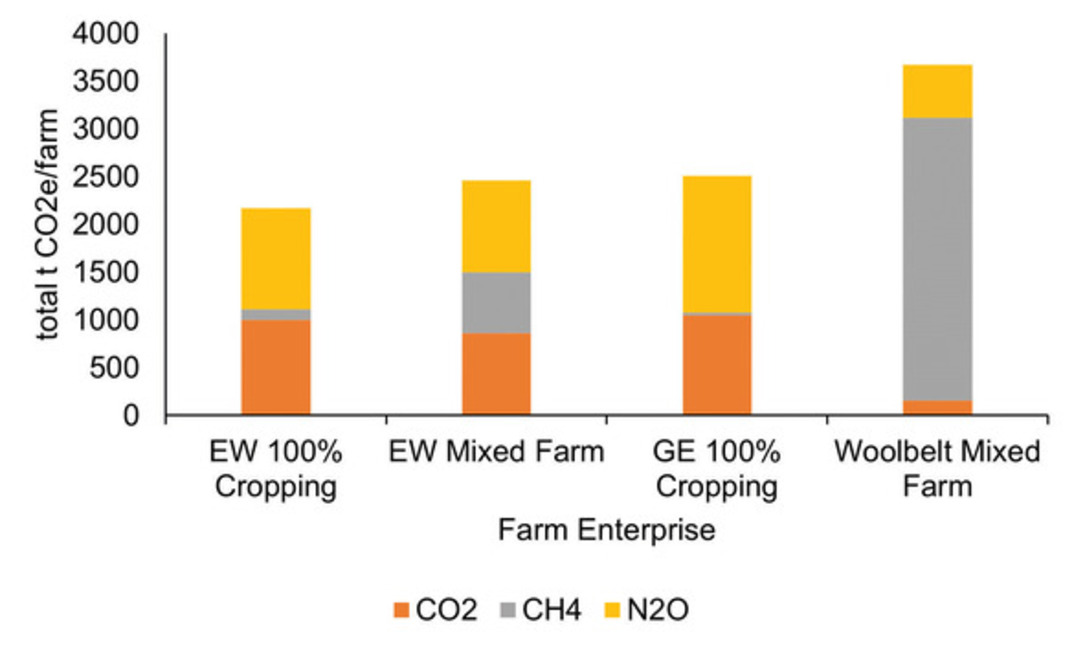As part of the Western Australian Government's commitment to emissions reduction and the sustainable mitigation of climate change, the Department of Primary Industries and Regional Development (DPIRD) has been investigating and funding research to reduce agriculture's carbon footprint to promote climate resilience.
The department's Katanning Research Facility (KRF) is a commercial farm running approximately 8000 wool and meat sheep combined with a cereal and legume cropping program.
It is DPIRD's primary facility for sheep research with intensive animal facilities. The farm comprises 2100ha, of which 1700ha is arable land It is a significant greenhouse gas (GHG) emitter with estimated annual emissions of 2553 t CO2-e.
The site provides an opportunity to improve our understanding of emissions arising from agriculture, particularly livestock production and the research project aims to utilise technology and modify land use at the farm to meet the target of zero net carbon emissions by 2030.
The KRF strategy, available from the department's website, outlines the methodology, breaks down baseline emissions, product intensity, opportunities to reduce crop and livestock emissions and sequestering carbon and vegetation.
DPIRD researchers have also calculated the emissions from four farming enterprises, using tools designed specifically for Australian producers: (SB-GAF) Sheep & Beef GHG Accounting Framework V1.4 and (G-GAF) Cropping GHG Accounting Framework V10.2 from the PICC website.
The example farms are an Eastern Wheatbelt 100 per cent cropping enterprise; Eastern Wheatbelt mixed grain and sheep enterprise; Geraldton Medium Rainfall 100 per cent cropping enterprise and a Woolbelt mixed sheep and grain enterprise.
A comparison of the four different farming systems emission breakdowns can be found as part of the comparison displayed in Figure 1.
Mandy Curnow, DPIRD Emissions Reduction Initiative Lead, said "It's really important to get a handle on what your farm's likely emissions are so you can start to make some decisions about how the emissions might be reduced or mitigated and whether you want to generate low carbon produce or are interested in selling your carbon mitigation as a Carbon Credit. Using the tools listed will give farmers a good start in that process."
Alongside this ongoing research, DPIRD has established a Western Australian Agriculture Climate Resilience Fund. DPIRD, Co-operative Bulk Handling and Wide Open Agriculture have begun a collaboration to research and measure greenhouse gas (GHG) emissions at the farm gate level for the WA grain industry.
The Carbon Neutral Grain Pilot Project will undertake a ground truthing exercise, measure and assess emissions of 15 - 20 producers across climatic zones and farming systems including traditional and emerging cropping systems; test and calibrate the data across three leading GHG calculators.
Calculator development has largely been left to the private sector with marketing leading calculators and certification systems mostly being driven by European standards. This is a significant constraint for developing certification systems which are evidence based and suitable for Australian production systems and calibrated for Western Australian conditions.
These initiatives, with more in the pipeline, offer to accelerate the innovation and practice change required to achieve carbon neutrality from the farm to international produce markets - whilst not forsaking economic competitiveness and productivity.
More information:
- Western Australian Agriculture Climate Resilience Fund
- Katanning Research Facility - Strategy to achieve carbon neutrality by 2030
- Western Australian example farms
Contact:
Mandy Curnow
mandy.curnow@dpird.wa.gov.au
climateresilience@dpird.wa.gov.au
ABOUT THIS COMPANY
DPIRD WA
DPIRD working with landholders & Land Restoration Program to develop innovative carbon farming projects within south west agricultural region.
HEAD OFFICE:
- 3 Baron-Hay Crt, South Perth, WA, 6151, Australia
- Phone: 893634129
- Website: www.agric.wa.gov.au
- Email: carbonFarming@dpird.wa.gov.au
























